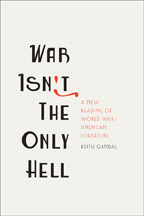
Gandal applied the “Page 99 Test” to his new book, War Isn't the Only Hell: A New Reading of World War I American Literature, and reported the following:
War Isn’t the Only Hell attempts to put American World War I literature in its proper historical context. It also tries to expand the canon, beyond the work of famous Lost-Generation authors Hemingway, Faulkner, Fitzgerald, Dos Passos, Cummings, and Katherine Anne Porter. Our sense of American Great War writing--and thus of the American experience--is limited and misguided. Unlike every other combatant nation, our lasting literature was written entirely by noncombatants; moreover, we don’t understand what it meant to be an American noncombatant male and why Lost-Generation writing is the way it is.Learn more about War Isn't the Only Hell at the Johns Hopkins University Press website.
American World War I literature has long been interpreted as an alienated outcry against modern warfare and propaganda. This reading ignores the US army’s unprecedented attempt, during the war, to assign men—except, notoriously, African Americans—to positions and ranks based on merit. And it misses the fact that the culture granted masculinity only to combatants, while noncombatants experienced a different alienation: shame.
Drawing on military archives and current historical research, the book discusses the work of thirteen significant writers: as responses to the shocks of war and meritocracy. The supposedly antiwar texts of the social-privileged male Lost-Generation authors addressed—often in coded ways—noncombatant frustrations. Meanwhile, the hard-hitting works of combat soldiers William March, Thomas Boyd, Laurence Stallings, and Hervey Allen were partly shaped by experiences of meritocratic recognition, especially meaningful for socially disadvantaged men.
Even the sole World War I novel by an African American veteran, Victor Daly, reveals a mixed experience of army discrimination and empowerment among the French. Finally, three women authors—Porter, Willa Cather, and Ellen La Motte, a frontline nurse—saw the war create new opportunities, prerogatives, and obligations for women. Ultimately, this literature registered the ways in which innovative military practices and a foreign war unsettled traditional American hierarchies of class, ethnicity, gender, and even race.
The Page 99 Test has limited applicability here, as this page concludes a chapter that shows how Hemingway’s A Farewell to Arms appealed to noncombatants. It still concerns one of our literary giants.
Most of the book is dedicated to less familiar writers. Its title comes from Daly, who covertly tells a taboo racial story that has been largely missed by critics. During this centennial of American involvement in the war, I suggest we broaden our canon so this long-forgotten American war becomes a major cultural touchstone.
--Marshal Zeringue



